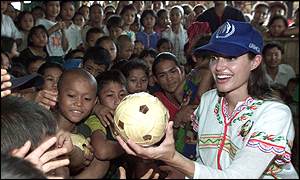 Martin Luther King, Jr.
Martin Luther King, Jr., is celebrated today. I'm in favor of living his wisdom, rather than just honoring his life with words.
King lived the third way, rejecting both violent revolt and passive acceptance of injustice. He taught and lived the way of
nonviolent activism. Government leaders will attend photo ops today at African-American churches and ceremonies for King, but they seem less likely to bring King's philosophy to bear on the "
war on terror."
In addition to his revolutionary efforts for civil rights, I also respect that King worked to end the Vietnam War and economic inequality. Justice, he was a man of justice.
My memorial to King will be his own
words:
A nation that continues year after year to spend more money on military defense than on programs of social uplift is approaching spiritual doom.
All labor that uplifts humanity has dignity and importance and should be undertaken with painstaking excellence.
An individual has not started living until he can rise above the narrow confines of his individualistic concerns to the broader concerns of all humanity.
An individual who breaks a law that conscience tells him is unjust, and who willingly accepts the penalty of imprisonment in order to arouse the conscience of the community over its injustice, is in reality expressing the highest respect for the law.
At the center of non-violence stands the principle of love.
Darkness cannot drive out darkness; only light can do that. Hate cannot drive out hate; only love can do that.
Every man must decide whether he will walk in the light of creative altruism or in the darkness of destructive selfishness.
Faith is taking the first step even when you don't see the whole staircase.
I believe that unarmed truth and unconditional love will have the final word in reality. This is why right, temporarily defeated, is stronger than evil triumphant.
If physical death is the price that I must pay to free my white brothers and sisters from a permanent death of the spirit, then nothing can be more redemptive.
Injustice anywhere is a threat to justice everywhere.
It is not enough to say we must not wage war. It is necessary to love peace and sacrifice for it.
It may be true that the law cannot make a man love me, but it can keep him from lynching me, and I think that's pretty important.
Law and order exist for the purpose of establishing justice and when they fail in this purpose they become the dangerously structured dams that block the flow of social progress.
Life's most urgent question is: what are you doing for others?
Love is the only force capable of transforming an enemy into friend.
Man must evolve for all human conflict a method which rejects revenge, aggression, and retaliation.
Means we use must be as pure as the ends we seek.
Never succumb to the temptation of bitterness.
Nonviolence is a powerful and just weapon. which cuts without wounding and ennobles the man who wields it. It is a sword that heals.
Nonviolence means avoiding not only external physical violence but also internal violence of spirit. You not only refuse to shoot a man, but you refuse to hate him.
Our scientific power has outrun our spiritual power. We have guided missiles and misguided men.
Peace is not merely a distant goal that we seek, but a means by which we arrive at that goal.
Philanthropy is commendable, but it must not cause the philanthropist to overlook the circumstances of economic injustice which make philanthropy necessary.
Pity may represent little more than the impersonal concern which prompts the mailing of a check, but true sympathy is the personal concern which demands the giving of one's soul.
Rarely do we find men who willingly engage in hard, solid thinking. There is an almost universal quest for easy answers and half-baked solutions. Nothing pains some people more than having to think.
The first question which the priest and the Levite asked was: "If I stop to help this man, what will happen to me?" But... the good Samaritan reversed the question: "If I do not stop to help this man, what will happen to him?"
The function of education is to teach one to think intensively and to think critically. Intelligence plus character - that is the goal of true education.
The hope of a secure and livable world lies with disciplined nonconformists who are dedicated to justice, peace and brotherhood.
The means by which we live have outdistanced the ends for which we live. Our scientific power has outrun our spiritual power. We have guided missiles and misguided men.
The past is prophetic in that it asserts loudly that wars are poor chisels for carving out peaceful tomorrows.
The quality, not the longevity, of one's life is what is important.
The ultimate tragedy is not the oppression and cruelty by the bad people but the silence over that by the good people.
To be a Christian without prayer is no more possible than to be alive without breathing.
We must concentrate not merely on the negative expulsion of war but the postive affirmation of peace.
We must develop and maintain the capacity to forgive. He who is devoid of the power to forgive is devoid of the power to love. There is some good in the worst of us and some evil in the best of us. When we discover this, we are less prone to hate our enemies.
We must use time creatively.
We who engage in nonviolent direct action are not the creators of tension. We merely bring to the surface the hidden tension that is already alive.









